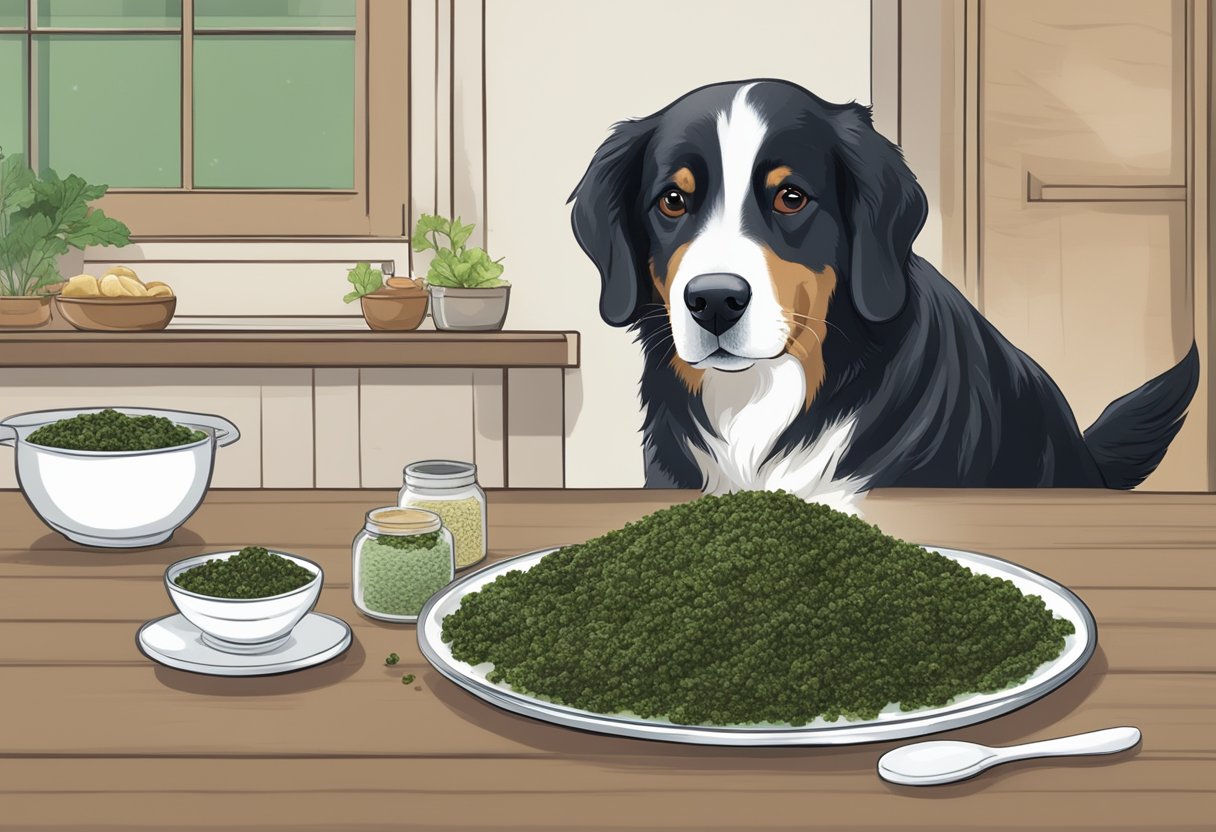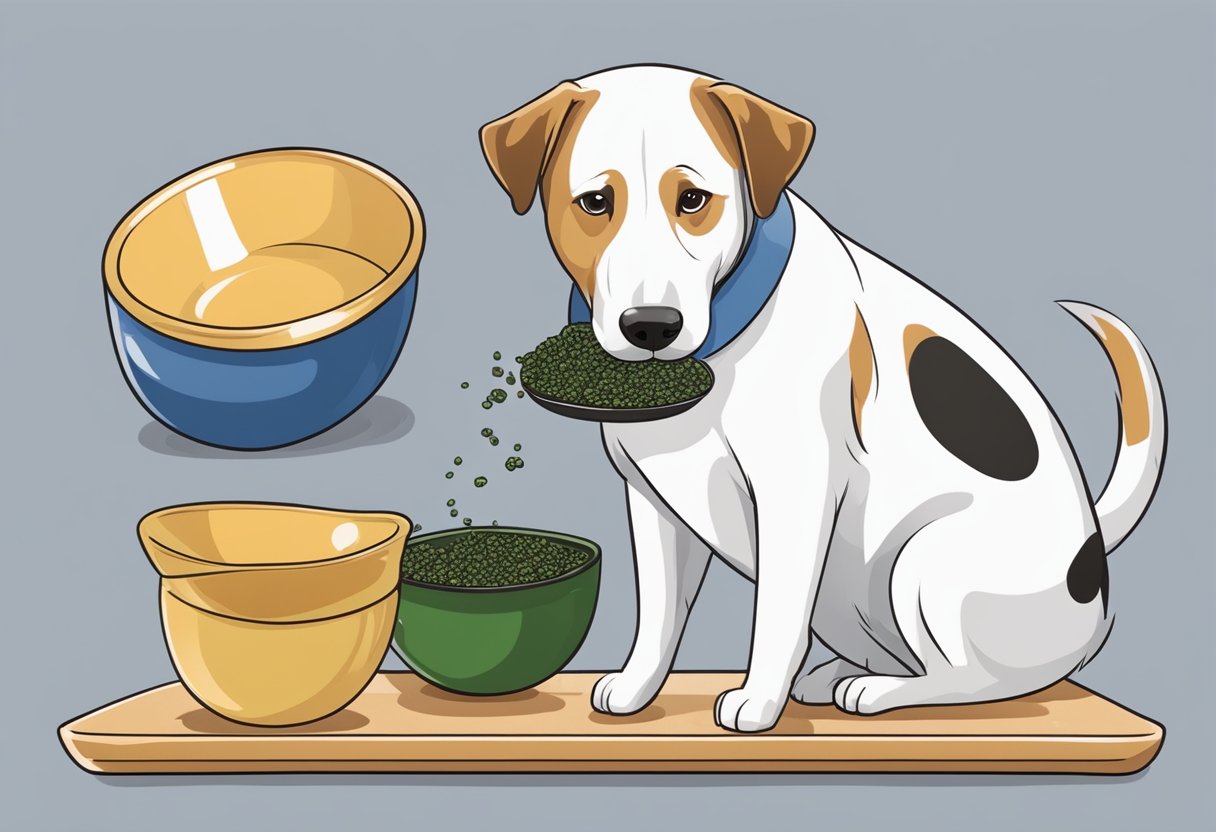Nori, the seaweed commonly used to wrap sushi, has piqued the curiosity of many pet owners regarding its safety and nutritional value for dogs. This edible sea vegetable is rich in vitamins, minerals, and amino acids which can offer health benefits to dogs when incorporated into their diet in moderation. It's important, however, to understand the appropriate feeding practices and recognize the differences in canine and human nutritional needs.
While nori is non-toxic to dogs, it's crucial to consider the form in which it's fed to them. The plain, unsalted variety of nori is generally safer than those with added seasonings or flavorings that could contain harmful ingredients such as garlic or onion powder. As with any treat, nori should be given to dogs in limited quantities to prevent any potential health issues, keeping in mind that dogs have different digestive systems and dietary requirements compared to humans.

Key Takeaways
- Nori is safe for dogs in moderation and can provide essential nutrients.
- Plain, unsalted nori is preferable to avoid harmful additives.
- Treats like nori should be a small part of a dog's balanced diet.
Health Benefits of Nori for Dogs

Nori seaweed, commonly enjoyed as a part of sushi dishes, offers various health benefits when included in a dog's diet. Nori is rich in proteins and various nutrients, which can be advantageous to dogs if given in moderation. The following are some of the primary benefits nori provides:
- Vitamins and Minerals: Nori is a source of vitamins A, C, and B-complex, and minerals like iodine, iron, and potassium. These contribute to maintaining healthy skin, eyesight, and immune system function in dogs.
| Nutrient | Benefit for Dogs |
|---|---|
| Vitamin A | Supports vision and skin |
| Vitamin B | Aids in energy metabolism |
| Vitamin C | Antioxidant properties |
| Iodine | Essential for thyroid function |
| Iron | Helps prevent anemia |
| Potassium | Regulates fluid balance |
- Protein Content: It contains a substantial amount of protein, which plays a critical role in canine muscle development and repair.
-
Low in Calories: It is a low-calorie treat option that can be beneficial for weight management in dogs.
-
Fiber: Nori contains dietary fiber which can promote digestive health.
-
Omega-3 Fatty Acids: The presence of omega-3 fatty acids is beneficial for a dog’s coat, skin, and overall immune system.
When considering nori for dogs, it is important to serve it plain, without seasonings or additives such as salt which could be harmful. Additionally, moderation is key, as overconsumption can lead to health issues, especially concerning thyroid function due to excess iodine. Always consult a veterinarian before introducing any new food into a dog's diet.
Potential Risks and Considerations

While nori can be a healthy snack for dogs in moderation, there are several risks and considerations that owners should be aware of before feeding nori to their pets.
Allergic Reactions
Some dogs may exhibit allergic reactions to seaweed. Symptoms may include itchiness, rashes, or gastrointestinal upset. If they show any signs of an allergic reaction, discontinue feeding nori and consult a veterinarian.
Salt Content
Nori sheets often contain high levels of salt which is not ideal for a dog's diet. Too much salt can lead to:
- Dehydration
- Increased blood pressure
- Sodium ion poisoning
It's essential to check the sodium content on the packaging or opt for unsalted nori sheets.
Seasonings and Additives
Many nori products come with seasonings and additives that are harmful to dogs. These may include:
- Garlic powder
- Onion powder
- Artificial flavors
Owners should select plain nori with no added seasonings or additives to ensure the safety and health of their dog.
Safe Feeding Practices

When introducing nori to a dog's diet, it's important to do so gradually. Dogs can eat both nori sheets and nori seaweed, but they should be plain and unsalted. It's essential that any nori fed to dogs does not contain seasonings, garlic, or onions, which can be harmful.
Before serving nori, it should be cut into small, manageable pieces to prevent choking or gastrointestinal blockage. Feeding nori in moderation is key because excessive consumption could lead to an excess of vitamins and minerals, potentially disrupting the dog's nutritional balance.
Here's a simple guide for serving nori to dogs:
| Quantity | Frequency | Preparation |
|---|---|---|
| A small piece | Occasionally | Plain, without additives |
Make sure to:
- Monitor the dog's reaction to their first few servings of nori.
- Consult with a veterinarian if there's any uncertainty about dietary changes.
- Watch out for signs of an allergic reaction, including itching or gastrointestinal distress.
Remember, while nori can be a good source of vitamins and minerals, it is not an alternative to a balanced, species-appropriate diet for dogs. Always consider a dog's individual dietary needs and restrictions while incorporating any new food item into their meals.
Alternative Snacks for Dogs

When considering treats for dogs, there are numerous safe and healthy alternatives to nori. Pet owners should opt for snacks that cater to a dog's nutritional needs and support their health.
Vegetables: Many vegetables are excellent for dogs. They can enjoy:
- Carrots: Crunchy and good for teeth.
- Green Beans: Low in calories and filling.
- Cucumbers: Refreshing and low-calorie.
Fruits: Certain fruits are also dog-friendly, such as:
- Apples (without seeds)
- Blueberries: Antioxidant-rich.
- Watermelon (seedless)
Commercial Treats: There are commercially available treats that are formulated specifically for dogs. These treats are designed to be:
- Nutritionally balanced.
- Low in fat and sugar.
- Size appropriate.
DIY Treats: Pet owners can prepare homemade snacks, such as:
- Baked sweet potato slices; natural and vitamin-rich.
- Frozen yogurt drops; for a cool treat on a hot day.
| Safe Protein Snacks | Benefits |
|---|---|
| Plain, cooked chicken | High in protein, no fatty seasonings. |
| Peanut butter (xylitol-free) | Good source of healthy fats. |
| Cooked salmon | Omega-3 fatty acids for healthy coats. |
Pet owners must ensure that all chosen snacks are given in moderation and not as a replacement for a balanced diet. Each dog has individual dietary needs and restrictions. Always consult a veterinarian before introducing new snacks into a dog's diet.
Frequently Asked Questions

Ensuring the safety and health of dogs is a top priority for pet owners. Seaweed can be incorporated into a canine's diet, but it's crucial to be aware of the type and preparation of the seaweed.
Is it safe for dogs to consume seaweed that has been seasoned with salt?
Seasoned seaweed often contains high levels of salt, which is not advisable for dogs. Consuming salted seaweed can lead to sodium ion poisoning.
What potential hazards does seaweed pose to canines?
Seaweed can expand in the stomach if ingested in dried form, potentially causing blockage or gastrointestinal upset. Also, the high iodine content may disrupt thyroid function.
What should I do if my dog ingests seaweed while at the beach?
If a dog eats seaweed at the beach, it's important to monitor them for signs of distress. Consult a veterinarian if you notice vomiting, diarrhea, or signs of dehydration.
Can I give my dog seaweed that contains sesame oil?
Feeding dogs seaweed with sesame oil should be done cautiously. Although not toxic, oils can cause stomach upset and should generally be avoided in high amounts.
What are the health advantages of including seaweed in a dog's diet?
Seaweed is rich in vitamins and minerals, which can support a dog's immune system, coat health, and digestion when given in proper amounts.
What are the signs of seaweed poisoning to look out for in dogs?
Signs of seaweed poisoning include vomiting, diarrhea, lethargy, and swelling of the neck. Immediate veterinary attention is crucial if these symptoms occur.




